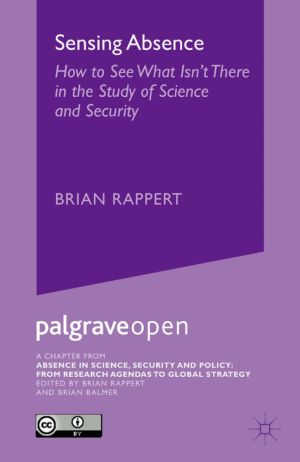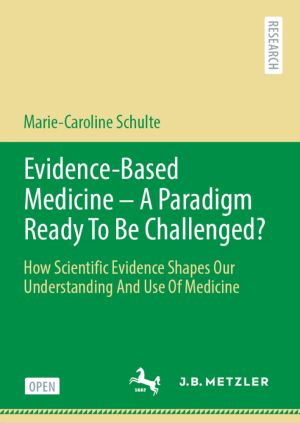Philosophy
Free Download Open Books
by Jeff Kochan
In this bold and original study, Jeff Kochan constructively combines the sociology of scientific knowledge (SSK) with Martin Heidegger's early existential conception of science. Kochan shows convincingly that these apparently quite different approaches to science are, in fact, largely compatible, even mutually reinforcing. By combining Heid...
by Brian Rappert
This is a chapter from Absence in Science, Security and Policy edited by Brian Rappert and Brian Balmer. Part reflection on the forthcoming chapters, part analysis of academic literature, and part programmatic agenda setting, this introduction chapter forwards the importance of questioning taken for granted assumptions in sensing what is absent as ...
by Thomas Müller
This volume seeks to further the use of formal methods in clarifying one of the central problems of philosophy: that of our free human agency and its place in our indeterministic world. It celebrates the important contributions made in this area by Nuel Belnap, American logician and philosopher.Philosophically, indeterminism and free action can see...
by Yulong Li
This book provides anthropological insights into the arduous yet rewarding journeys involved in selected TESOL teachers' pedagogical transition to teaching English for Academic Purposes (EAP) at universities in Shanghai, the largest metropolitan area in China. Applying a unique combination of ethnography and phenomenology, the book offers in...
by Lori A. Roscoe, David P. Schenck
This casebook provides a set of cases that reveal the current complexity of medical decision-making, ethical reasoning, and communication at the end of life for hospitalized patients and those who care for and about them. End-of-life issues are a controversial part of medical practice and of everyday life. Working through these cases illuminates bo...
by Jiri Benovsky
This open book is about exploring interesting borderline cases of art. It discusses the cases of gustatory and olfactory artworks (focusing on food), proprioceptive artworks (dance, martial arts, and rock climbing qua proprioceptive experiences), intellectual artworks (philosophical and scientific theories), as well as the vague limits between pain...
by Christian Wittrock, Ellen-Marie Forsberg, Auke Pols, Philip Macnaghten, David Ludwig
This open book offers a unique and practically oriented study of organisational and national conditions for implementing Responsible Research Innovation (RRI) policies and practices. It gives the reader a thorough understanding of the different aspects of RRI, and of barriers and drivers of implementation of RRI related policies. It shows how diffe...
by Christoph Bartneck, Christoph Lütge, Alan Wagner, Sean Welsh
This open book introduces the reader to the foundations of AI and ethics. It discusses issues of trust, responsibility, liability, privacy and risk. It focuses on the interaction between people and the AI systems and Robotics they use. Designed to be accessible for a broad audience, reading this book does not require prerequisite technical, legal o...
by Marie-Caroline Schulte
This open book aims to clarify the term „evidence-based medicine" (EBM) from a philosophy of science perspective. The author, Marie-Caroline Schulte discusses the importance of evi-dence in medical research and practice with a focus on the ethical and methodological prob-lems of EBM. The claims that EBM can herald a new theory of epistemolog...
by Jaap Bos
This open access book offers a practical guide into research ethics for undergraduate students in the social sciences. A step-by-step approach of the most viable issues, in-depth discussions of case histories and a variety of didactical tools will aid the student to grasp the issues at hand and help him or her develop strategies to deal with them.T...










